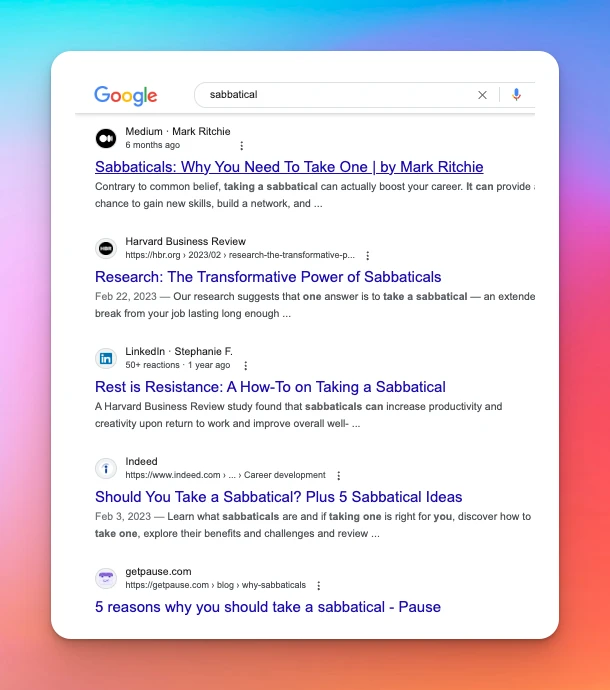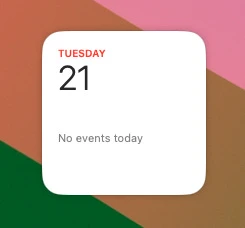
Pay Yourself First
I was a software engineer working for one of the big tech companies. I spent my time sitting in endless meetings scattered throughout the day. I had frequent headaches and neck pain.
Pay Yourself First is a strategy in personal finance where you set aside a portion for savings before paying your bills, forcing yourself to adjust your spending accordingly. I have begun to apply the same concept in life, prioritizing my health and well-being above other commitments.
When I worked the corporate job, I had it all backward. Work came first, and then the rest of my life, sandwiched between deadlines. When there was a big launch, the first thing that had to go was exercise, quickly followed by eating well and spending time with loved ones. A sure sign you’ve entered burnout season is when PMs start calling the team fam.
On top of my headaches and neck pain, I injured my knee, and for a while, I could barely walk. If you’ve ever been sick or injured, you’ll know that nothing matters more to you than getting well. Why don’t we take better care of ourselves? Instead, we work our asses off, thinking that it’ll all be worth it one day when we retire.1 At work, they offered free mindfulness lessons; at one point, I recall they sent emails announcing this month was Wellness Month. The only problem was I was too overwhelmed to get through all my emails and notifications, much less spend my evenings attending online seminars (meetings!) about burnout risk.
I was burnt out and had reached a point where the only thing I could do to remain sane was quit. I had to decide to put myself first. Today, 7 months later, it’s been one of the best decisions I can recall making. Many people were shocked when I said I quit my job and looked terrified by the mere thought of spending some savings. (Either that or they couldn’t grasp that I had savings.) On that note, if you’re not setting aside some money every month, you should seriously reconsider your priorities because not having any savings is how you ensure you’ll be trapped in the hamster wheel forever.
You can take some time off even if you don’t quit your job like I did. I know people who have negotiated paid—or partly paid—sabbaticals with their employers. When I resigned, I, too, was offered a sabbatical, but I was too burnt out at the time to even consider that offer. I needed a clean break. Thus far, I’ve treated my time off much like a sabbatical.
Historically, sabbaticals were a period off for study, travel, rest, and pursuing personal interests, and it was something university professors would do occasionally to stay relevant. If quitting feels like a drastic move, consider discussing sabbatical options with your employer, highlighting how it can benefit you and the company by preventing burnout and renewing productivity.

A lot of people online are advocating taking time off. In his newsletter, Paul Millerd writes:2
I suspect that we’ll look back on continuous employment throughout adulthood as a temporary phenomenon of industrialization. In a world where more work is creative, abstract, and specialized, I think the “break” from work will become far more common (if not expected).
When you no longer have to squeeze your life into a schedule designed for factory assembly lines at the Industrial Revolution, many new opportunities open up. Like exercising during the day and working when you feel the most creative.
What I do now is prioritize my health and wellness. I won’t be one of those older people who have trouble getting out of the chair—I’m making sure I won’t be. The first thing I do in the morning, before waking the kids or brewing coffee, is put on my workout clothes. When the kids leave for school, I go to the gym. Why wouldn’t I? I’m already wearing gym clothes!
When you work out daily, you don’t need to work quite as hard as those who do it only once or twice. The gym is full of busy people trying to cram as much exercise as possible into the least amount of time. They’ll be running between machines, trying to exercise multiple muscle groups simultaneously so they don’t have to sit still for a minute between reps.

The need to save time and be more productive is so deeply ingrained in us that we no longer question it. We frown upon leisure time and feel bad for doing nothing.
The ancient Greeks had the right idea. The Greek word for leisure, σχολή (scholē), is actually the basis for the English word “school.” To the Greeks, leisure wasn’t just about relaxation but also about engaging in activities that improved the mind and the soul. Being free from 9-5 has been an eye-opener, and I’m now looking forward to Mondays instead of dreading them.

Just like how you quickly stop noticing when you Pay Yourself First that the sum is gone from your budget, I also no longer notice the effort of working out. My neck pain and headaches are a thing of the past, and I feel stronger, more creative, and more focused than ever.
You should consider a sabbatical.
-
At what age, 70? That number keeps going up. ↩
-
Paul Millerd on Sabbaticals, Regrets, Youth Mode, Elites School Districts ↩